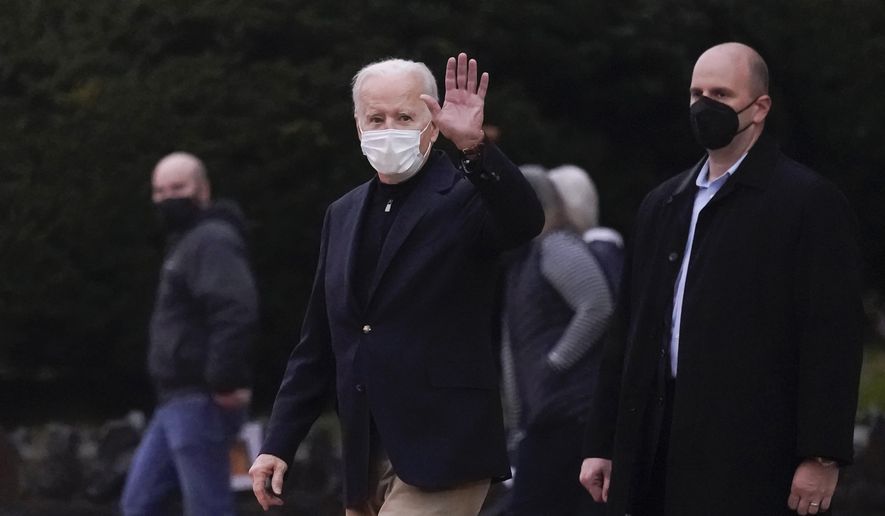President Biden on Monday pledged $1 billion of taxpayer money to boost independent meat and poultry producers and undercut industry giants, escalating his months-long battle with the meat industry over high inflation.
Mr. Biden said four large companies control 85% of the beef market, 54% of the poultry market, and 70% of the pork market — and use their near-monopoly to stifle competition and overcharge.
“Capitalism without competition isn’t capitalism. It’s exploitation,” Mr. Biden said at a White House event. “That’s what we are seeing in meat and poultry and those industries now. Small independent farmers and ranchers are being driven out of business — sometimes businesses that have been around for generations.”
The $1 billion includes $100 million to reduce the cost of inspections for small meat-processing facilities and $800 million to provide grants and loans to improve capacity and workforce issues, new technology and facility expansion or construction. The first $150 million will be made available this spring.
Meat prices in November rose by 21% compared to November 2020, according to data from the Department of Agriculture. Overall, good prices jumped 6.4% compared to last year, with meat, poultry, fish, and eggs rising by 13%.
The country’s largest meat industry said Mr. Biden’s proposal to tackle rising food prices misses the mark on why costs have increased.
SEE ALSO: Biden to promote meat-industry overhaul, hoping to rein in prices
Sarah Little, a spokeswoman for the North American Meat Institute, said labor shortages and shutdowns of meat production facilities because of COVID-19 are the real culprits — not monopolies and price-fixing as Mr. Biden contends.
Ms. Little said the price increases are because the COVID-19 pandemic shut down production plants, leaving farmers with nowhere to send their beef.
That resulted in culling cattle and other livestock because of uncertainty about future demand. As restaurants opened back up, consumer demand for beef increased despite less livestock, sending prices north.
At the same time, processing plants have been dealing with a labor shortage that has reduced their ability to process meat at the same pace as before the pandemic. That has led to a supply and demand imbalance, impacting prices.
“Labor remains the biggest challenge. Our members of all sizes cannot operate at capacity because they struggle to employ a long-term stable workforce. New capacity and expanded capacity created by the government will have the same problem,” she said.
Derrell Peel, a professor of agriculture business at Oklahoma State University, said there’s no debating that four beef industry giants dominated the industry for nearly 30 years.
SEE ALSO: Meat industry knocks Biden plan for federal spending to lower beef prices
In the years before the pandemic, meat producers began shuttering processing plants because of oversupply. That shortened packing capacity, a situation that worsened because of COVID-19.
The four big processors in the meat sector are Tyson Foods Inc., Cargill, Brazil-based JBS SA, and National Beef Packing Co, which is also controlled by a Brazilian company.
While the companies did not respond to requests for comment, all four are members of the North American Meat Institute.
Farmers groups hailed Mr. Biden’s proposal. Scott Blubaugh, president of the Oklahoma Farmers Union, who participated in the White House event, said local meat processors will enable farmers and ranchers to retain a greater share of retail profits when the beef is sold.
“For too long, we have seen the multinational meatpackers suck out all of the wealth of rural America and put it in their corporate coffers, and in some cases, even overseas,” he said.
Mr. Biden has routinely blamed price profiteering for higher prices. In November, he instructed the Federal Trade Commission to investigate whether oil and gas companies are engaging in “illegal conduct” by profiting from higher gas prices. The FTC is also probing whether retailers used the supply chain chaos to raise prices.
Larry Summers, an economist and veteran of Democratic administrations, last month warned that Mr. Biden’s antitrust efforts will only worsen inflation because it will reduce supply and reduce innovation.
Still, the administration keeps pressing forward.
Attorney General Merrick Garland, who attended the White House event, announced the Justice and Agriculture departments have launched a new initiative to improve reporting of potential antitrust violations.
“Anti-competitive practices in agriculture, as in any industry, hurt the American people, producers, consumers, and workers alike,” Mr. Garland said.
• Jeff Mordock can be reached at jmordock@washingtontimes.com.




Please read our comment policy before commenting.